
Dear Fashion: Let’s Step Up and Get Aligned
In a recent opinion editorial with WWD, CEO Colin Browne argues fashion needs to take more serious and coordinated action on sustainability. Read the highlights here!
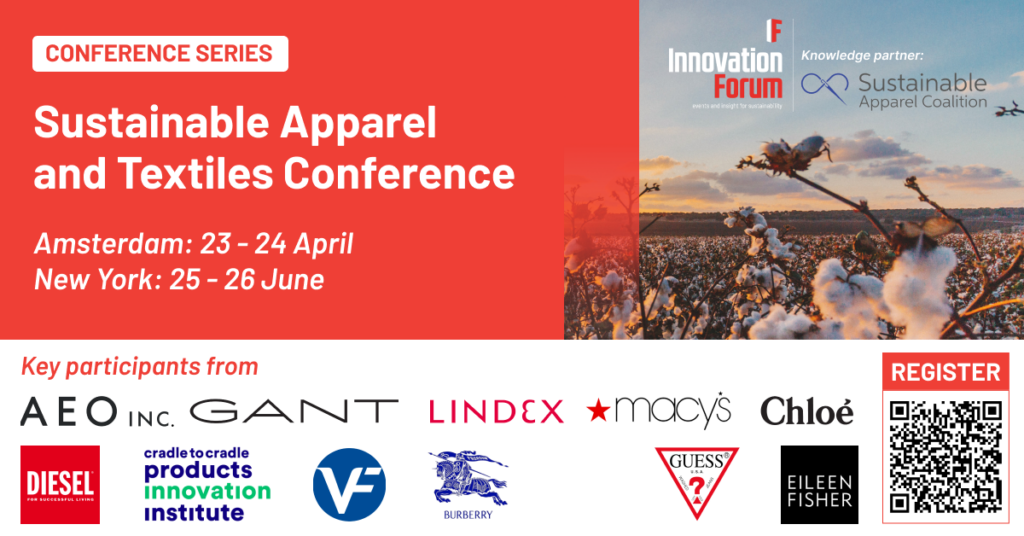
The collaboration kicks off in 2024 for sustainable apparel and textile events.
The Sustainable Apparel Coalition (SAC) is teaming up with Innovation Forum (IF) in a new media collaboration announced this month.
As part of the collaboration, the SAC will join IF on their two flagship Sustainable Apparel and Textiles Conferences, happening in spring 2024. IF looked to collaborate with the SAC, given the nonprofit’s strong representation in apparel and textiles – representing over half of the industry. The organizations will collaborate on session programming, speakers, event marketing, and more.
The first conference takes place in Amsterdam on April 23 to 24, followed by New York City on June 25 to 26. The Amsterdam conference promises over 350 attendees across the apparel industry. The forum will cover how brands can align on incoming legislation, deliver on ambitious climate goals, transform supply chains, scale circularity, engage consumers, and drive positive social impacts, per IF. Meanwhile, the New York event aims to convene over 200 stakeholders addressing apparel’s biggest sustainability challenges and opportunities ahead.
On the news, Lee Green, senior director of communications, at the SAC, said: “After having SAC members attend and speak in the past at Innovation Forum events, it felt like a great opportunity to deepen our involvement. We look forward to collaborating with them as we look to raise awareness about key challenges impacting the industry and, of course, discussing solutions that involve all players along the value chain.”
Drawing on the high-level discretion of the subject matter and attendees, both forums are held under Chatham House rule, meaning speakers can not be directly attributed but information can be used freely.
More information on the collaboration will be available soon.
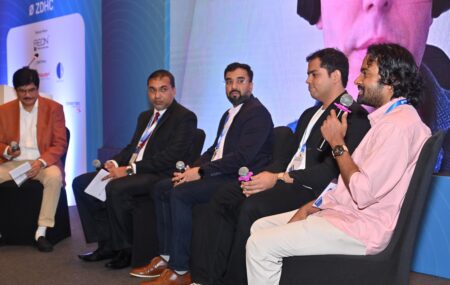
The ZDHC South Asia Conference in Bengaluru, India facilitated high-level conversations on sustainability, including a panel discussion on chemical management. Moderated by Prasad Pant, South Asia Director and Competence Centre Director for the ZDHC Foundation’s Roadmap to Zero Program, “The Need for Collaboration in Accelerating Sustainable Chemical Management” panel included Dhawal Mane, SAC Director of Verification, Training & Insights. Fellow panelists included Klaehn Gundolf, Head of Environmental Component, Responsible Industrial Practices in the Clothing Industry in Asia (FABRIC), Shivam Gusain, Innovation Analyst at Fashion for Good, Vidhesh Kadam, Standards & Recycled Materials Specialist at Textile Exchange, and Edga Melan, General Manager Engineering & Sustainability, Teejay Sri Lanka, Joint Apparel Association Forum (JAAF) and Fabric Apparel Accessory Manufacturers Association (FAAMA) in Sri Lanka.
Mane emphasized the deep collaborations that drive SAC action on chemical management, including a close partnership with ZDHC to align their Supplier to Zero Program with the Higg Facility Environment Module (FEM); similarly, the alignment of FEM with the RtZ and StZ programs is rooted in the apparel alliance, which was formed by the Apparel Impact Institute, Textile Exchange, ZDHC Foundation, and the SAC in order to align tools and programs to achieve greater alignment and avoid duplicating efforts. Complementary tools are the bedrock of the apparel alliance’s goal of creating a connected, end-to-end path to action for the entire apparel and footwear industry as we work together to achieve a minimum goal of 45% reduction in GHG emissions by 2030.
Mane talked about SAC’s updated strategic plan, and its focus on aligning the facility’s journey geared towards impact. “With about 8000 factories completing the Higg FEM verifications, we recognise the several touch points facilities have with various supply chain sustainability programs and collaborative organizations.”
One of the key outputs will be an industry-wide standardized environment performance framework and factory journey, which will provide clarity and insight on how brands and their supply chains can best utilize different programs to drive continuous improvement on environmental performance at the factory level, and how these programs are connected and can facilitate the most impact. His final call to action was for continued collaboration with industry stakeholders to address the challenges we face as an industry.
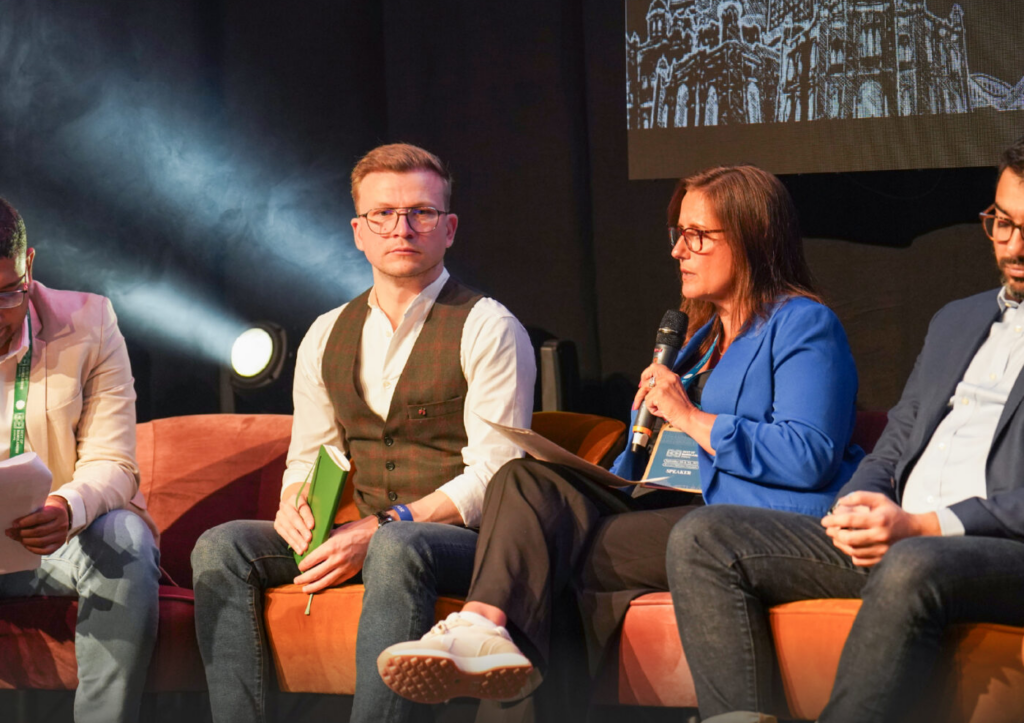
At a recent event hosted by Best of Bangladesh in Amsterdam, Lisa Domoney, SAC’s Senior Director of Membership and Corporate Engagement, discussed “Sustainable Sourcing Realities: Challenges, Achievements, and Next Steps” on a panel moderated by Omar Gias, Director, Strategic Engagement at the Bangladesh Apparel Exchange. The focus of the discussion was to explore how sustainable practices can combat critical issues related to the fashion industry’s environmental and social impact, especially in light of its rapid growth.
“The event was filled with optimism and hope,” Domoney said. “It celebrated the successes and incredible progress made in Bangladesh over the last decade, but that there is still a long way to go.” She was joined by Andrei Vasiliev, Responsible Sourcing/Social Impact Manager for Bestseller, Syed Tanvir, Managing Director of Pacific Jeans Limited, Joris Aperghis, CEO of WE Fashion, Rensje Teerink, Deputy Director of the Asia-Pacific Department at EEAS, Willeke Hendriks, Director of Global Sourcing & Product Development at G-Star RAW, and Karin Reimerink, CR Senior Director at PVH Europe.
The session was a pivotal moment for addressing the ethical considerations and responsible sourcing practices that are essential to transformation of the apparel industry sustainably. Vasiliev highlighted the importance of protecting worker rights and detailed how Bestseller has empowered more than 20,000 women in Bangladesh through the RISE program. Tanvir shared the impact of sustainability initiatives such as water recycling and clean energy, as well as the work that Pacific Jeans is doing in Bangladesh to provide university scholarships to women workers and vision care for all. Aperghis called for consumer education on sustainability and the benefits of legislation to support these goals, while highlighting the work that WE Fashion is doing on sustainability for the brand. Teerisk also called for clear legislation and explained how the EU is moving towards carbon neutrality, while exploring how developing economies with large textile industries can be supported in their transition to more sustainable manufacturing practices. And Hendriks shared the strategies that G-Star has embraced to reach a 30% GHG reduction by 2030, including producing locally and choosing more sustainable materials.
Domoney underscored the SAC’s vital role and vision for the industry, emphasizing the work of member companies that use the Higg Facility Social & Labor Module (FSLM) and the Higg Facility Environmental Module (FEM) to achieve social and environmental goals, as well as the SAC’s unwavering commitment to collaborative efforts that drive positive change. Her presentation was complemented by Reimerink’s discussion of PVH Europe’s ethical sourcing program, which utilized the Higg FEM to establish baseline data, as well as their collaboration with Better Work.
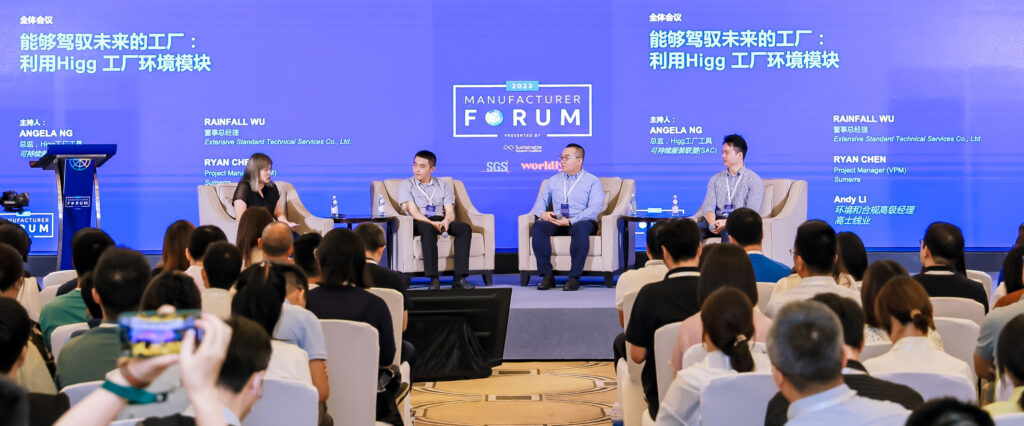
After a four-year hiatus, the Sustainable Apparel Coalition returned to hosting in-person Manufacturer Forums with the “Catalyst for Change” event in Shenzhen, China. SAC Manufacturer Forums are a series of action-oriented events aimed at bringing together business leaders and stakeholders for solution-centered discussion on how to drive sustainability improvements throughout global supply chains.
The event gathered 180 participants at the Sheraton Shenzhen Futian Hotel for sessions on policy, supply chain dynamics, decarbonization, standardizing facility data collection, verification, and more. Attendees learned about how the SAC and its member organizations collectively work together to drive improvements in the apparel, footwear, and textile industry.
Sing Bin Lim, Head of Hub Asia at bluesign technologies, kicked off the event with a keynote that emphasized the need to address climate change at the country level — as well as the challenges faced by facility owners and even individuals who are unsure how to tackle such a vast objective. Lim highlighted solutions found through increased knowledge and collaboration — both upstream with financial institutions and downstream with customers — which is demonstrated by SAC’s collaboration with the Apparel Impact Institute (Aii), Textile Exchange, and ZDHC on the Apparel Alliance, as well as the SAC’s ongoing partnership with Worldly, which helps brands report on essential data, including carbon emissions, through use of the SAC Higg tools.
The critical need for data was echoed by the SAC’s Angela Ng, Director of Higg Facility Tools, who introduced the Social & Labor Convergence Program (SLCP)’s new WE Tech worker engagement program. Ng highlighted the difference between the SLCP’s Converged Assessment Framework (CAF) and the Higg Facilities Environmental Module (FEM) and how scoring is applied to make the industry fair together. SAC’s Betty Li, Senior Manager of Membership Engagement for Asia-Pacific (APAC), honed in on how increased scrutiny and regulation allow companies to analyze data and show progress year over year.
Moran Zhang, a Research Analyst at the World Resources Institute’s China Climate and Energy Program, detailed the relevant policies that will impact manufacturers, including the EU’s Circular Economy Action Plan and the Green Deal, and introduced the Science Based Targets Initiative (SBTi) as a tool that can be used to track emissions. Zhang shared information from the “Roadmap to Net Zero: Delivering Science-Based Targets in the Apparel Sector” report [https://www.wri.org/research/roadmap-net-zero-delivering-science-based-targets-apparel-sector] that was published in 2021 by WRI and the Apparel Impact Institute (Aii), a SAC partner.
Jessica Jia, the SLCP representative in China, shared how the program is actively expanding to more industries such as accessories, furniture, and home decor. With 4.7k users and over 400 verifiers, China is the SLCP’s biggest user base by far. Jia shared information on the CAF 1.6, emphasizing how the updates have simplified the steps and optimized the data.
Attendees were also briefed on updates to the Higg Index suite of tools, including FEM 4.0, scheduled to launch later this year, and the SAC’s new Decarbonization Program. Discussions emphasized how important brands are to drive tools adoption.
“We were honored to have hosted industry stakeholders at our Manufacturer Forum,” said Jeremy Lardeau, Vice President, Higg Index. “As an organization committed to transforming business through groundbreaking tools and collaborative partnerships, we believe through initiatives such as the Manufacturer Forums, we can help solve the industry’s most urgent and systemic challenges.”
The SAC’s next Manufacturer Forum will take place this December 4 in Bangalore, India. Click here for more information and to save the date!

Joyce Tsoi, SAC’s Director of Collective Action Programs, participated in a conversation on “Making Carbon Finance Projects Work for Farmers” at the recent Better Cotton Conference. In addition to Tsoi, speakers included Maria Kjaer, Sustainable Livelihoods Manager for Better Cotton, Amelia Sidumo, Senior Regional Coordinator for Better Cotton, and Thomas Blackburn, Head of Business Development & Partnerships at SustainCERT.
At the conference, participants discussed the potential of carbon finance projects in the agricultural sector, with a specific focus on cotton production and how the industry can collaborate with farmers on successful projects.
Cotton producers face critical challenges related to climate change, including impacted germination and yield, deteriorating quality, and increased labor costs — to name a few. Because cotton farming communities can vary greatly in size and most reflect an extensive network of cooperatives, associations, and agribusinesses, organization of coordinated responses to these challenges can also be difficult.
However, collective action through data-backed solutions such as carbon financing can help build more resilient cotton farming communities and mitigate potential future damage to farming systems posed by extreme weather events such as droughts and floods.
To make these projects work, speakers explained, stakeholders must leverage expertise and data, as well as direct or indirect relationships with farming communities, to inform decision making on purchasing and investments.
Speakers highlighted the need to move quickly on smart legislation, rather than delay in anticipation of a definitive data set. They also defined the need for traceability and verifiable data when setting climate mitigation targets and GHG accounting to meet regulatory compliance requirements, while acknowledging the complexity of communicating with consumers.
They discussed how the industry can collaborate on collective action with workers, such as developing insurance policies for climate adaptation, engaging the technology sector on improved mechanization for intercropping, improving conventional production, or supporting a just transition to organic and regenerative farming methods. Sharing costs for accessing and sharing data could involve roles for capital markets and governments.
Solutions raised included alternative irrigation systems, solar energy, and circular innovations to reduce carbon emissions, all of which have the potential to reduce overall costs, diversify incomes, and unlock access to premium markets. Finally, the speakers highlighted the potential impact on worker wellbeing, as well as ways that these projects could be designed to respect communities, such as trainings in local languages, technical capacity building, and including female workers.
The conference was well facilitated, with good Global South representation and room for diverse angles on solutions — such as analysis of whether and to what extent decreased production might be considered alongside climate adaptive practices. Speakers agreed that the need for primary data was paramount, and that traceability and impact measurement is critical in developing solutions. They were reminded to continually look outside of specific industries, learn from each other’s experiences, and share progress collectively to inspire others to take action.

Jeremy Lardeau, Vice President of the Higg Index at the Sustainable Apparel Coalition, joined the CEO Dialogue at a recent Net Zero Pakistan event to engage with industry leaders and share insight on how the industry can collectively work together to enable a net zero future for Pakistan’s textile sector.
Lardeau spoke on the “Positioning Pakistan as a Sustainable Textile Export Hub – Learning from Global Manufacturing Nations” panel with Laila Petrie, CEO of 2050.cloud, climate journalist Afia Salam, and Dr. Shamshad Akhtar, former State Bank Governor and Trustee of PET. The goal of the discussion was to provide insights on Pakistan’s decarbonization progress as compared to other manufacturing countries, share examples of large-scale global decarbonization interventions, and discuss the role of media in shaping the narrative around sustainability initiatives.
Lardeau highlighted the fact that, on a macro level, Pakistan faces significant challenges in transitioning to net zero as the economy and its GDP is heavily dependent on fossil fuels: Currently, 64% of electricity comes from fossil fuels, 27% from hydropower, and 9% from nuclear and renewable energy sources. He noted that it is one of the top 10 countries where it is critical to support collective action on decarbonization.
In 2021, the country committed to reduce GHG emissions by 30% by 2030 under the Nationally Determined Contributions (NDCs) that are critical to the Paris Agreement. To achieve this goal, the Pakistan Government plans to increase its renewable energy in its electricity mix to 60% compared to the current level of 4% — a transition that will require significant investment in infrastructure and advanced technology.
Prior to attending the conference, Lardeau’s team analyzed data from the SAC’s Higg Facility Environment Module (FEM) and found that of the nearly 300 facilities in Pakistan that use the tool, 75% have been verified. The facilities are heavily reliant on fossil fuels — 58.3% of energy comes from burning natural gas and 22.7% comes from burning coal — and their total emissions are 4.15 megatons CO2e annually.
In response to a discussion of PET’s exploration of a biomass supply chain project that could help phase out coal, Lardeau referenced huge opportunities to scale renewables at Pakistan’s facilities, which currently have a .19% adoption rate. He also referenced the upcoming Higg FEM 4.0 release, which will better support collaborative efforts to drive change.
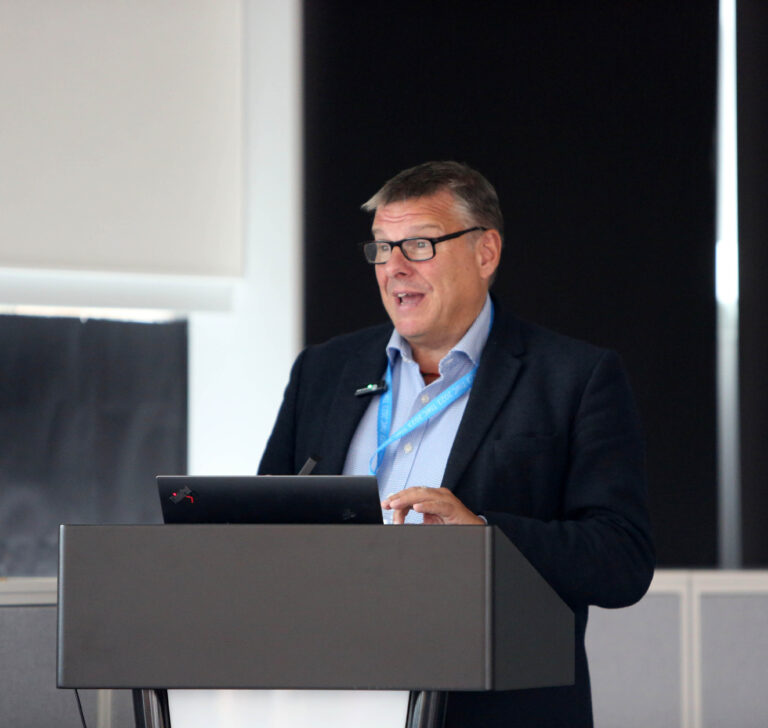
SAC Executive Vice President Andrew Martin recently gave a keynote speech at the 92nd Textile Institute World Conference (TIWC) 2023, which took place in Queensgate, Huddersfield at the University of Huddersfield on July 3-6, 2023.
Speaking on the topic titled, Vigilance and influence: The role of academia in transforming industry, Martin took to the stage to share specific challenges currently facing the industry in achieving effective and rapid change, which members of the academic community and professional experts have a great opportunity and important role in addressing.
Martin opened his keynote by giving a brief history of the SAC, including the challenges the industry faced while working in silos and the inspiring idea from two unlikely companies that brought the sector together around a universal approach to measuring sustainability performance. Launched as the Higg Index suite of tools, this approach set the industry on a collaborative path towards driving collective action. Reflecting on the progress achieved including in areas such as collaborating with data, insights, capacity building, and more, Martin noted there were still obstacles the industry was facing, which also presented an opportunity for motivating even deeper collaboration.
Martin highlighted persistent challenges in the increase of reports, campaigns, and media stories, based on poor science and unsubstantiated research, which sometimes lack transparency regarding funding or authorship. He explained that this often results in the creation of sustainability and circularity narratives that are not always scientifically sound and do not truly reflect the complexities and nuances of sustainability and circularity, while also lacking the integrity and accuracy critical to drive credible actions.
Acknowledging genuine efforts by stakeholders to contribute to and accelerate change in order to build a sustainable future for the industry and the world, Martin highlighted the risks of employing narratives that create division, pit industry players against each other, and influence civil society, stakeholders, policymakers, and consumers with flawed information.
As an example, Martin highlighted the challenges we face with oversimplification, leading to binary messaging – i.e. “this thing is good and this thing is bad” – and the threat that this poses to slowing or even halting the urgently-needed holistic progress needed across the whole industry.
“The world has reached a critical point in the climate crisis,” Martin said. He then shared three key areas in which we believe the academic community could contribute to solutions with the nuance and clarity that’s necessary to achieve effective progress: materials, policy, and processes, which ensure that rigor, transparency and credibility are upheld. He challenged academics to come together and collaborate on the development of a framework to help expose and eliminate flawed, counter-productive narratives in reports, campaigns, and the media. Finally, he called upon them to leverage their voice and expertise to become active influencers, calling out bad science, spotlighting the more nuanced work, and providing the insights needed to drive positive action.
“We can’t go on relying on shallow soundbites,” Martin said. “We need your knowledge, experience and credibility to drive the change we all want and need to see.” He completed his keynote speech with a clear call to action: Members of the academic community and experts should get involved and to share their knowledge, experience, and credibility to help drive collective change, support collaboration, and ultimately deliver real progress for a better future.
Read more in Andrew’s opinion piece in environment journal.
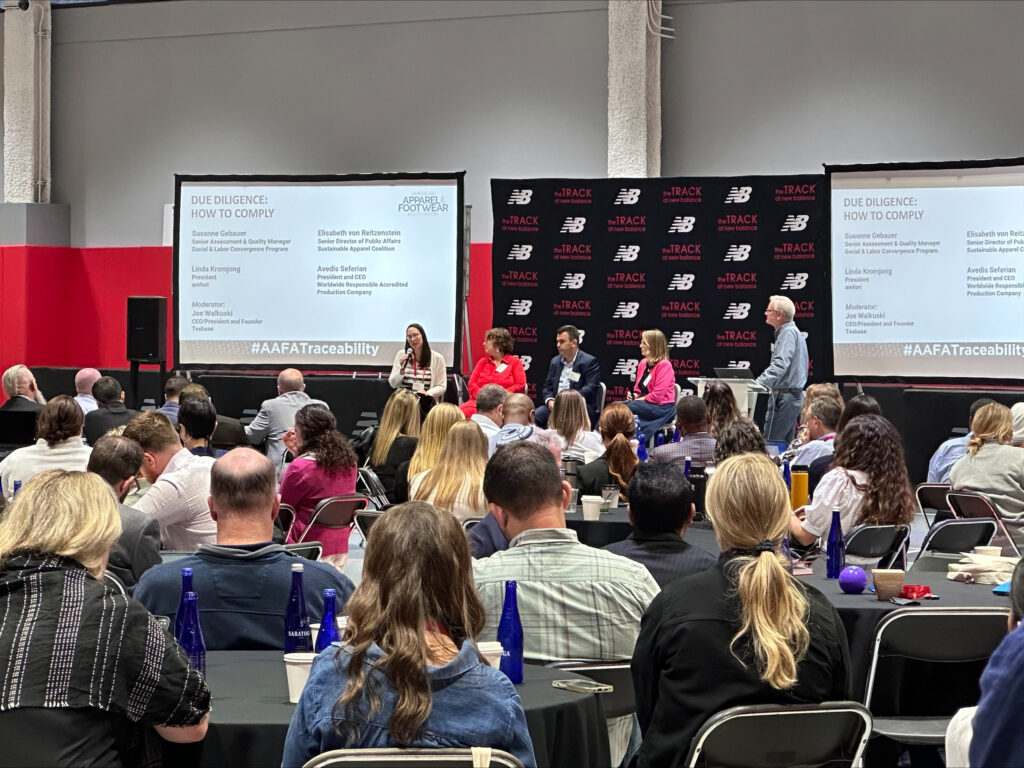
Elisabeth von Reitzenstein, SAC Senior Director of Public Affairs, was a key speaker in a critical discussion on due diligence at the AAFA Traceability & Sustainability Conference on July 26th in Boston, MA. Hosted by the AAFA, the panel was moderated by Joe Walkuski of Texbase and also included Susanne Gebauer, Senior Assessment & Quality Manager at the Social & Labor Convergence Program (SLCP), Linda Kromjong, President of amfori, and Avedis Seferian, President and CEO of Worldwide Responsible Accredited Production. The talk centered around critical efforts of businesses in the apparel and footwear industry to achieve sustainability goals while staying competitive in an ever-changing market.
As von Reitzenstein shared, the Sustainable Apparel Coalition brings together nearly 50% of the global apparel and footwear supply chains — from global brands and retailers to manufacturers, NGOs, academics, and industry associations — in a pre-competitive space to collaborate for impact on its most urgent and systemic challenges. The SAC’s use of groundbreaking tools like the Higg Index helps foster collaborative partnerships and drive change.
At the SAC, von Reitzenstein leads global activities in public affairs, policy, and advocacy to execute on the mission to transform business for exponential impact — and create a more sustainable, equitable, and just world for all. Together with the other panelists, she outlined how SAC works together with other organizations to ensure that the industry can and will comply with emerging regulations while helping to avoid the duplications of efforts.
“In order to effectively support our members, we cannot just focus on one piece of legislation but must analyze several in relation to the Higg Index tools,” von Reitzenstein said. She outlined how the Higg tools align with best industry practice standards, connecting the dots between how the Higg Facility Social & Labour Module (FSLM) integrates with the Social and Labor Convergence Program (SLCP), as well as how a major update to the Higg Brand & Retail Module (BRM) aligns with best-in-class industry standards. “Our Higg Index tools don’t just provide a standardized measurement of value chain sustainability, but also support companies with relevant, compliant disclosure,” she said.
The panel discussed European due diligence legislation including the Corporate Sustainability Due Diligence Directive (CSDDD), Corporate Sustainability Reporting Directive (CSRD), German Due Diligence Act, and the EU Forced Labour Regulation — all of which were deemed promising for the global sustainability agenda as disclosures are increasingly considered necessary to responsible corporate behavior.
As due diligence in the EU evolves, von Reitzenstein said, the SAC continues to prioritize mapping and analysis in order to build a broad picture of the landscape, and remains committed to transparently sharing its findings. This analysis feeds into the development of tools that support SAC members as they navigate and meet new and evolving regulations.
The panel concluded by emphasizing the importance of working together. As von Reitzenstein put it: “Cooperation with other stakeholders is key. We’re already doing a lot but can always do more — we might not be at the beginning but we are also not at the end of that journey.”

The Sustainable Apparel Coalition (SAC) is excited to announce the election of two new board members and the re-election of an incumbent board member to serve on the SAC Board of Directors. These esteemed individuals will be seated on the Board in September 2023. The Board of Directors plays a pivotal role in guiding the SAC’s strategic plan, and driving industry transformation, advancing our organization’s mission of sustainability and positive impact.
The SAC is pleased to welcome:
These individuals bring a wide breadth of knowledge and valuable insights, each contributing a unique perspective critical to advancing our vision for a more equitable and restorative industry.
Harsh Saini brings over 25 years of global experience in sustainability, manufacturing, compliance, communication, brand and crisis management, and trade relations. She has also been an influential figure on multiple boards and committees, including Global Compact, Better Work, FLA, Bangladesh safety programs, OECD, The Fashion Pact, AAFA, ETI, SAC, and GFA.
“I am honored to have been selected to serve on the SAC Board of Directors representing the Affiliate member category,” said Harsh. “I look forward to collaborating with fellow members and industry players to support SAC’s vision and strategic initiatives for an even greater impact in our industry.”
Amanda Tucker, with 25 years of experience in building coalitions to deliver change, possesses extensive expertise in sustainability, sourcing, labor rights, and governance across three continents. Her innovative approaches will be invaluable as we strive for a more sustainable future.
Grateful for her election to the Brand/Retailer seat, Amanda stated, “In order to make significant strides towards sustainability, I believe that we must work together and commit to learning and adapting with our partners to reach our shared goals. I am excited and honored to bring my expertise to the board with a goal to deliver meaningful change and impact at scale.”
Dr. Delman Lee will return to the board, representing the Manufacturer member category. He has been a key advocate since the SAC’s inception, actively supporting equal partnership and providing invaluable expertise and insight on the challenges facing manufacturers, and opportunities to deepen collaboration to ensure every voice throughout the supply chain is heard.
“I am honored to have the opportunity to continue representing the SAC manufacturer member category on the Board of Directors,” said Delman. “It is a privilege to work alongside such dedicated and passionate individuals in driving our mission and shared vision forward. I remain committed to leveraging my experience and expertise to amplify the voices of my fellow manufacturer members and contribute to the collective efforts in achieving our sustainability goals. Together, we will make a lasting impact and create a more sustainable future for our industry.”
The SAC CEO, Amina Razvi said, “We are thrilled to welcome our newly elected and re-elected Board members. The combination of their unique perspectives and wealth of experience will be instrumental in accelerating the SAC’s efforts toward a more equitable and restorative industry. Only by working together will we achieve the necessary transformation within the consumer goods industry and steer it towards a more sustainable and responsible future.”
The SAC is deeply grateful to outgoing Board members Rüdiger Fox, CEO/Chief Environmental Activist at Sympatex, and Jonas Eder-Hansen, COO at Global Fashion Agenda, whose dedicated service and invaluable contributions have guided the organization’s strategic direction and initiatives throughout their tenure.
Learn more about SAC’s governance and view the current Board of Directors on our website today.
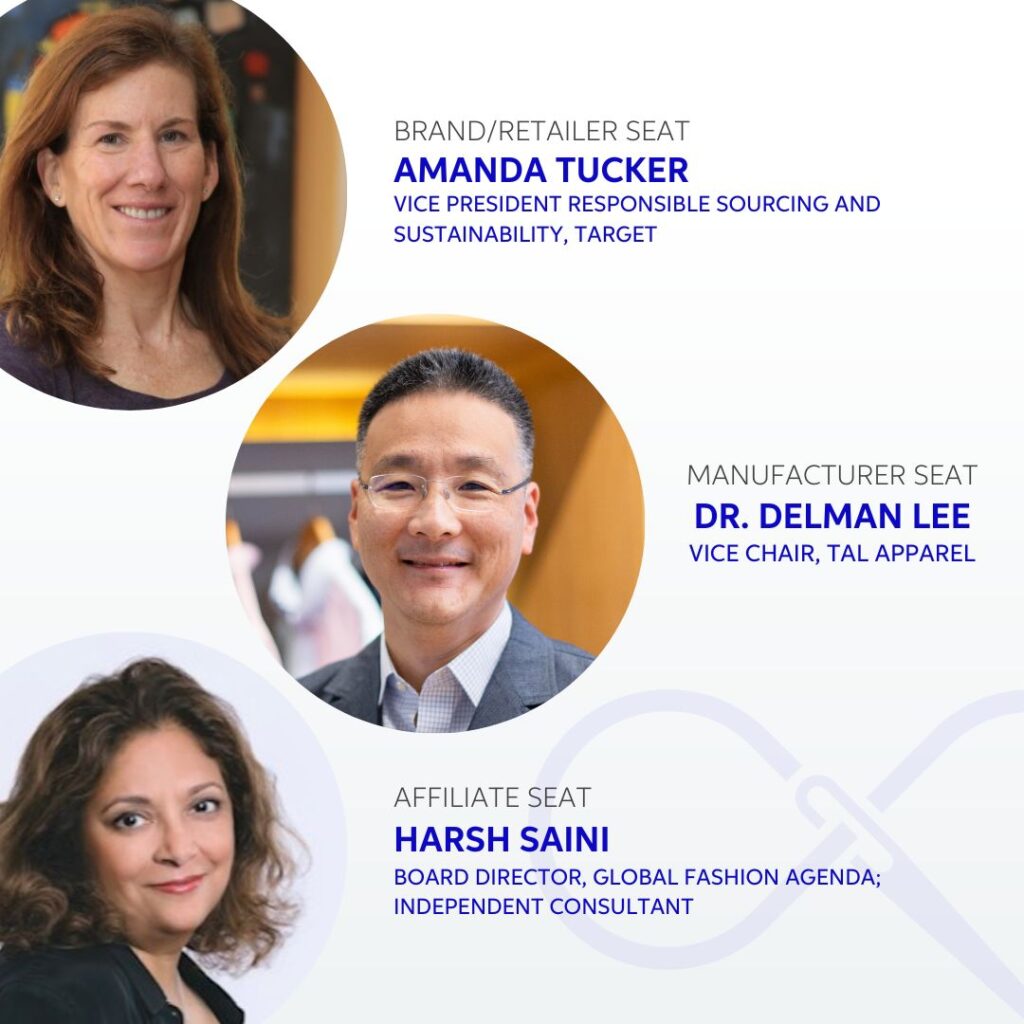
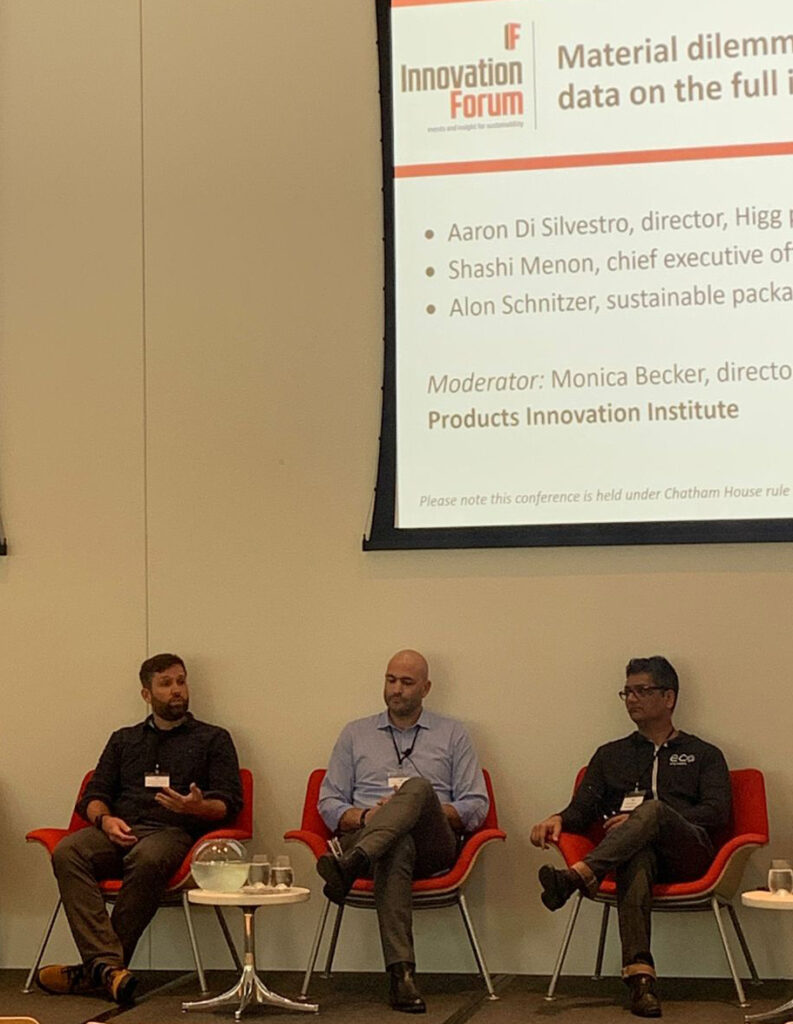
Director of Higg Products, Aaron Di Silvestro, spoke at the Sustainable Apparel and Textiles Conference, which took place in New York on June 21 – 22. The event, which the Sustainable Apparel Coalition partnered on with Innovation Forum, brought industry experts to discuss the urgency with which brands need to align their practices with growing stakeholder expectations and develop strategies for achieving net-zero, transforming supply chains, engaging consumers, scaling circularity, and driving positive social impacts.
Speaking on a panel titled, Material dilemmas: How to obtain credible data on the full impact of material decisions, Di Silvestro joined Alon Schnitzer, Sustainable Packaging Expert, Solutum, and Shashi Menon, CEO, EcoEngineers, to discuss challenges in obtaining credible data on the full impact of material decisions and how the industry can collaborate to address this.
The discussion kicked off with the panelists identifying a number of major challenges facing the industry such as understanding what data needs to be collected in order to make credible claims. They agreed that the lack of a clear and widely accepted industry methodology for making claims results in a lack of clarity on what data is needed.
Lack of collaborative processes for data collection and analysis was another identified challenge Often, this results in industry members independently pursuing work that has already been completed, leading to divergent methodologies that reduce credibility and increase the cost of obtaining and using data. The panelists also identified a lack of clarity and agreement around what “impact” means. This leaves any data, no matter how well founded, open to critique.
The panel went on to discuss opportunities for the industry to address these challenges and agreed that industry collaboration is necessary to reduce duplicative work around data gathering and analysis in order to clearly define what impacts should be measured and communicated and how. The panelists highlighted risks that the textile and apparel, packaging, and energy transition industries could face by deciding to wait on guidance from regulators to determine the nature of credible data, which could ultimately end up being insufficient to drive progress.
Instead, the panel suggested specific solutions – including the use of Open Supply Hub identifiers in internal and external industry data sets, as well as aligning on LCA and emission factor data sources – to help industry players identify and align on what credible data is and how it can be obtained.
The panel discussion featured a number of questions from attendees relating to the interplay between credibility and quality. It was evident from the discussions that there is a critical need to align on the quality of data before making decisions.
The panelists also agreed that data quality is only a single part of the credibility equation and that it is critical to ensure that data is run through the same models, then compared and used in similar ways, which is as – if not more – important than increasing the accuracy of our existing data points.
The discussion concluded with the panelists agreeing that there are concrete actions industry players can take to both obtain credible data and define the data they need. Finally, the panelists called for collaboration across the industry and again stressed the importance of credible data to incentivize the industry.